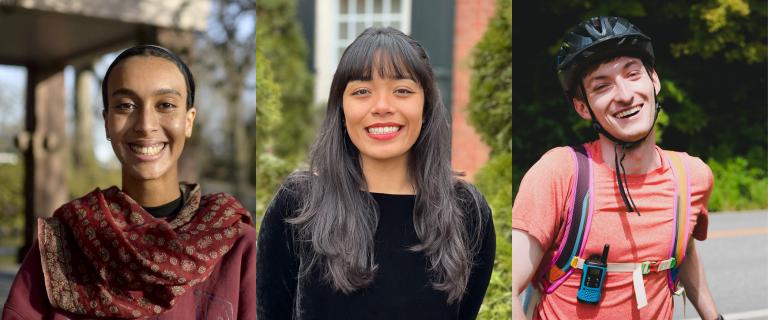
Three Yale Students Named Wyss Scholars
The Wyss Foundation, a charitable organization that supports land conservation in the U.S. and internationally, has selected three Yale students as 2024 scholars.

The Wyss Foundation, a charitable organization that supports land conservation in the U.S. and internationally, has selected three Yale students as 2024 scholars.
Three Yale students whose work focuses on a range of conservation issues including public land management and policy levers to protect critical habitats have been named 2024 Wyss Scholars.
Nasra Mohamed ’25 MEM, Victoria Ramirez ’25 MEM, and Taylor Wurts ’25 JD were selected by the Wyss Foundation for the program, which supports the graduate-level education of a new generation of leaders in U.S. land conservation.
As scholars they will receive tuition, internships, and postgraduate support and learn the latest in conservation law and policy. They will have the opportunity to apply that knowledge working at non-profit conservation groups such as The Nature Conservancy, and for government agencies such as the U.S. Forest Service and the National Park Service.
"It is a pivotal moment for conservation," said Indy Burke, the Carl W. Knobloch, Jr. Dean of the Yale School of the Environment. "The multitude of challenges confronting our landscapes—including mega-droughts, habitat loss, wildfires, development, and urban expansion—requires innovative solutions from the next generation of leaders. Thanks to the generous backing of the Wyss Foundation, these three exceptional scholars will gain the knowledge and skills to address these complex conservation issues equitably and sustainably."
Originally from Minnesota, Mohamed is interested in issues surrounding grassland conservation and land management in the Midwest. She works as an Urban Forester at YSE’s Urban Resources Initiative, is a member of the Forestry Club, and is organizing this year’s Environmental Film Festival. Before attending graduate school, she worked as a communications and outreach consultant, advising government agencies in Washington state on light-rail expansion and soil removal projects.
Mohamed plans to move to Madison, Wisconsin, after graduation and work for a nonprofit that helps mitigate land use change in the Midwest, preserves prairies, and supports private landowners in implementing land conservation practices.
“The Midwest is an essential region for conservation and climate change mitigation efforts. I want to help mitigate the impacts of conventional agriculture on the environment and preserve its biodiversity,” Mohamed says.
Ramirez became interested in pursuing a career in public land management after serving in AmeriCorps for two years in the Community Volunteer Ambassador Program at Glen Canyon National Recreation Area in Utah and Sequoia and Kings Canyon National Parks in California. At Sequoia and Kings Canyon, she also worked as a park ranger coordinating various projects, including giant sequoia monitoring, invasive species removal, trail maintenance, and more.
At YSE, Ramirez is an Education, Communications, and Events Fellow with the Yale Center for Environmental Justice. She said YSE has helped her develop effective science communication skills that she plans on combining with her policy and community engagement background to advocate for environmental justice on public lands.
After graduation, she plans to return to the West to work for the National Park Service.
“I am committed to aiding in the transition from the traditional conservation movement towards a more inclusive and restorative framework, increasing access to public lands, and focusing on opportunities for stewardship,” Ramirez says.
Wurts, a second-year law student at Yale Law School, is interested in developing novel litigation efforts that address conservation and climate change. He is co-president of the Yale Environmental Law Association, Vice President of the Yale Urban Law & Policy Society, and Executive Policy Editor of the Yale Law & Policy Review.
This summer, Wurts will work with the Conservation Law Foundation to explore litigation and policy levers to hasten the green transition and protect land across New England. After graduation, he hopes to work in government or at a nonprofit to advance litigation efforts that simultaneously conserve American landscapes and combat climate change.
“I am eager to use law and policy to further equity in conservation and climate action. I am especially excited to increase access to conservation land in historically overburdened and under-resourced communities through legal tools that can help fund remediation and restoration of environmental injustices,” Wurts says.